New Delhi: Any uniform civil code (UCC) should be “beneficial for all communities”’ and “well thought out, not hurried,” senior Rashtriya Swayamsevak Sangh (RSS) functionaries said a day after Uttarakhand Chief Minister Pushkar Singh Dhami formed a panel to implement such a code in the state, as he had promised before the assembly polls.
The RSS, which wants a UCC to come into force across India soon, also stressed the need for an “absolute consensus” among communities for this. “There are many customary laws among communities. All have to be respected, and only unfair practices should be weeded out through the UCC,” a top RSS central committee member, who did not wish to be named, told ThePrint.
Although the Sangh leaders don’t want to slow down the process, they want the government to build a consensus, especially among tribal communities — among whom the RSS has a huge following — which have well-entrenched customary practices related to marriage, worship, last rites, and inheritance.
The central committee member said, “We want a uniform civil code, but we also want consensus. There are so many intricate practices among communities. Those are very traditional rules under their respective personal laws.”
“The UCC covers not only marriage, but inheritance and adoption laws, too. Inheritance is a crucial factor among communities, and every religious or social group has their own laws for that. These issues need to be well deliberated,” he added.
Referring to the panel set up in Uttarakhand, he further said, “Let the committee come up with its reports — we will see them and decide what stand we should take. We have a resolution on the UCC, and we of course want it to be implemented soon. But it should be done in a systematic way, and shouldn’t create further divisions or tension among social and religious communities.”
‘Weed out unfair practices’
Another senior member of the RSS central committee said that the government should first remove “unfair practices” from existing laws.
“It’s not about Hindus, Muslims, Christians or tribals. It’s about bringing all under a common law, a unified justice system. Various communities cannot be governed by various personal laws,” he said.
“But we feel that the government should first weed out unfair practices like triple talaq, or not including daughters in property rights, and so on. There are many such practices among communities. These should be removed in a systematic way, and then we can talk about uniformity,” he added.
He further said that the government now needs to amend the personal law that permits polygamy. This is a clear reference to the Muslim Personal Law (Shariat) Application Act, 1937.
The functionary also expressed outrage over issues in Sharia law, such as the lack of rights and compensation afforded to divorced women. “Other personal laws, including the Hindu Marriage Act, allow the woman to demand her rights to property,” he said.
However, the RSS faces another dilemma over the implementation of the UCC in relation to tribal communities. The Sangh has a huge outreach among the tribal population, who they believe are not in favour of giving up their personal laws.
“The tribal communities have their personal laws, and if a UCC comes, all their customary practices would be abrogated. They have a feeling that, through the UCC, they would be branded as Hindus, which they are not,” said a third functionary who has worked among tribal people.
“We are working on the ground to assess the situation and keep appraising the government of it. But the report of the Uttarakhand committee, set up by the CM, will bring a perspective for all of us,” he added.
(Edited by Rohan Manoj)
Also read: RSS supports govt move to raise women’s marriage age, but wants ‘criminality’ clause dropped






